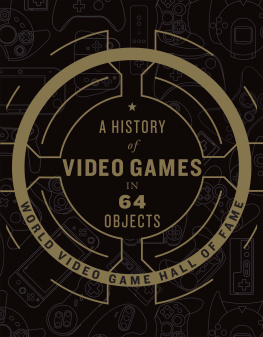cyber junkie
cyber junkie
escape the gaming and internet trap
kevin roberts

Hazelden Publishing
Center City, Minnesota 55012
800-328-9000
hazelden.org/bookstore
2010 by Kevin J. Roberts
All rights reserved. Published 2010
Printed in the United States of America
No part of this publication may be reproduced, stored in a retrieval system, or transmitted in any form or by any meanselectronic, mechanical, photocopying, recording, scanning, or otherwisewithout the express written permission of the publisher. Failure to comply with these terms may expose you to legal action and damages for copyright infringement.
Library of Congress Cataloging-in-Publication Data
Roberts, Kevin J.
Cyber junkie : escape the gaming and internet trap / Kevin J. Roberts.
p.cm.
Includes bibliographical references.
ISBN 978-1-59285-948-1 (softcover)
Ebook ISBN 978-1-59285-994-8
1. Video game addiction. 2. Internet addiction. I. Title.
RC569.5.V53R63 2010
616.8584dc22
2010019853
Editors note:
The stories in this book are true. Names, locations, and other identifying information have been changed to protect confidentiality; in some cases, composites have been created.
The information, ideas, and suggestions in this book are not intended as a substitute for professional advice. Before following any suggestions contained in this book, you should consult your personal physician or mental health professional. Neither the author nor the publisher shall be liable or responsible for any loss or damage allegedly arising as a consequence of your use or application of any information or suggestions in this book.
14 13 12 11 10 1 2 3 4 5 6
Cover design by Percolator
Interior design and typesetting by Percolator
To my mother.
You have always believed in me.
foreword
Only in recent years have we realized how prevalent addictions are in our modern society. We have progressed in our awareness from the abuse of alcohol and other substances, through countless sexual practices that may leave us both bereft of satisfying love and/or with profound feelings of shame, and were now discovering new ways to bedevil ourselves with behavioral addictions, such as compulsive shopping or gambling.
Kevin Roberts herein adds another behavioral addiction to this growing list. Of greater importance is his success in taking us inside the mind of an addict. There we can develop both empathy and foreknowledge as we read explicit details of how people can become addicted in the cyber world.
Some may laugh, saying that nowadays everything is being labeled an addiction. Yet a reading of the first few chapters is likely to change ones mind, as Roberts takes us in heart-wrenching detail through the progression that left him a true addict. He also gives us a window into the cyber world to appreciate its vast and multifaceted appeal. We gain a valuable perspective into a form of recreation and communication that captivates tens of millions.
Essential to recovery is to talk with rigorous honesty about ones own struggles, and Roberts admirably demonstrates this practice throughout the book. In addition, the author shows how common it is becoming for cyber activity to lead to true addictionsomething probably unsuspected by many who become addicts. Forewarned is forearmed.
I have personal knowledge on this subject. Since my retirement, I have spent lots of time playing bridge and solitaire games on the computer to soothe feelings of anxiety and shame. Its a short-term fix, which makes matters worse in the long run. Robertss book helps me to see the consequences of this behavior when it becomes compulsive. And calling it by namean addiction that medicates unwanted emotionsis a potent way of reducing its power to control our lives.
Like many addicts, I have traded one addiction for another throughout my life. Ive struggled for fifty-five years with compulsive eating. I used food to cover up unpleasant feelings and constant anxiety. For the last twenty or so years, I have learned to resist my addictive food impulses by bringing the situation into the light of honest examination and even lighthearted humor, just as Kevin Roberts does in this remarkable book.
John Everingham, Ph.D.,
editor of Men Healing Shame: An Anthology
and Breaking the Shackles: Bringing Joy into Our Lives
acknowledgments
I am blessed with many friends who supported me in writing this book.
- Tom and Ann Houston, for tireless efforts in editing and challenging me to become a better writer
- Nathalie Shamma, for her eagle-eye editorial skills
- John Everingham, for editing some chapters and convincing me that I could do it; also, for being a powerful mentor these last ten years
- my family, for blessing me on my journey and always encouraging me
- Tony Vicich, for inspiring me to reach for my dreams
- Tim Kowalski, for believing in me when I needed it most
- David Wolfe, for convincing me that I was a writer
- high school English teachers Bill Petrovich and George Duffourc, for inspiring me to push past my literary limits
- Fr. Ned Donoher, for igniting and empowering my creative mind
- Tim Batdorf, for leading the way with his own book
- Terry Shulman, for offering valuable advice when I started the book
- Sari Solden and Geri Markel, for supporting this process early on
- Doug Rutley, for catching me in the act of a gaming binge and scheming thereafter to get me to acknowledge my problem
- P. K., for kicking my butt to be productive and helping me structure both the book and my time
- A.S., for awakening dormant parts of my self
- Barb Evangelista, for being a steadfast friend who always offers me honest feedback
- Maureen and Elektra Petrucci, for being loyal friends, creative consultants, and fellow cultural creatives
- Ryan Isakow, for offering me a teenage perspective on gaming and constantly encouraging me in this endeavor
- Andy Carter, for helping me to appreciate the inner workings of World of Warcraft
- Andrew Luginbill, for showing me the lighter side of gaming and sharing many insights on his own gaming
- Lambrini Makris, Christos, and the folks at Montys Grill, for providing me with inspiration, support, and a place to write these many years
- all the folks I have worked with professionally, for trusting me with their stories
- and finally, thank you to all the following people, for helping me navigate through the depths of my issues: Ralph Johnson, Walter Clemens, Mike Dokuchic, Paul Soczynski, Bill Kauth, Charlie Emir-Gandalf-Carlo-Brother Lawrence Lewis, Barb Evangelista, Wayne Hicks, Palmer Stevens, and John Everingham
introduction
The Western world is in the midst of a cultural shift. Electronics and the Internet have transformed the way we live. Just a decade or so ago, devices such as computers, cell phones, and iPods were relative luxuries that made our lives easier or entertained us. For most people, these items are now nearly indispensable in both their work and their personal lives. The Internet and video gaming, likewise, are no longer used primarily for research or for occasional amusements. More and more, they are our main source of recreation.
For many people, video and computer games and other forms of digital technology are harmless. They offer convenience or a way to relax or have fun with friends and family members. Unfortunately, all of these devices also carry the potential to become addictive.

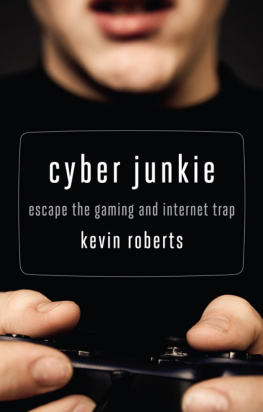






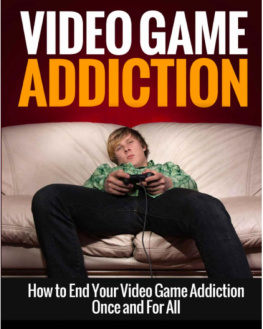
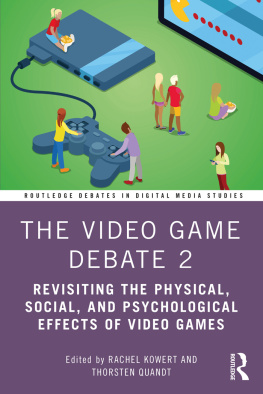
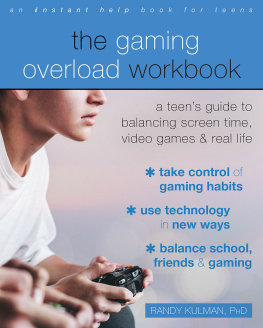

![Mark J. P. Wolf (editor) - Encyclopedia of Video Games: The Culture, Technology, and Art of Gaming [3 volumes]](/uploads/posts/book/279290/thumbs/mark-j-p-wolf-editor-encyclopedia-of-video.jpg)
